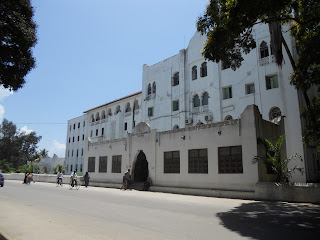The hospital placement is going well. We're now divided up between Gen Med and Surgery. All three of us rock up at around 8.00am for the ward rounds.
On the Gen Med floor, usually the doctors are ready to go by about half past, after the nurses and nursing students (we think) have documented the names and diagnosis of all the patients in the beds. There's 26 beds in the larger ward with the heart, respiratory, neuro and everything else patients, and about ten in the infectious ward - mostly immunocompromised patients. We work our way through all the patients in the order of the beds..reviewing progress and everything else just like any other ward round in Melbourne hospitals. The main difference is there's no hurry, kind of like everything in Zanzibar. The doctors are very good at the illnesses they see often (malaria, diabetes, HTN, pneumonia, various infections) but we've found that they are very impressionable to our suggestions especially with interpreting investigation results like blood tests, ECGs, xrays and CT scans. This could be because these investigations are relatively new to them, and although they order them frequently, it seems like they are lacking the skills to understand them fully. Just guessing there but it seems likely.. So, we feel kind of useful when we are asked for our opinions on these things.
Probably the biggest difficulty here for us is the language barrier. Swahili is the native language. The locals predominantly speak no English. The doctors write all the notes in English, however, so at least we can read them. And also the doctors have a pretty decent grasp of English so (when they feel like it, or are pressed) they can usually fill us in on what's happening. However, history taking doesn't seem to be a major priority, so there isn't too much Swahili for us to try to follow. The note taking is brief and to the point. Examination findings, meds, plans are documented every day.. all pretty standard. On Tuesdays and Fridays the students from the local med school join us for the round. There are quite a few that follow us around which makes it a bit harder for us to get in on the action on these days. The interesting thing about the students is that they learn from Cuban teachers (the school is part of Cuba's program to train more doctors worldwide, apparently) who speak to them in Spanish..then they write their notes in English..and they are speaking to the patients in their native Swahili. Given the broken nature of their English in conversation, one can be pretty sure that quite a lot of information is either lost or confused in translation. But it's good to see that the students are keen to practice their skills, and willing to learn, occasionally asking us for guidance too.
On the topic of skills, due to their being so little in the way of medical technology to reach Mnazi Mmoja hospital it is a good place to hone your clinical skills. We're a bit reluctant to put our hands up to take blood etc..that said, the rate of HIV is very low on the island. We've been told its 0.6% which we think is about the same in Melbourne. Not too sure about the rates of other transmissible diseases, but there's a lot of hepatitis we see on the ward.
Actually probably one of the best things for the ward would be chlorhex spray or ethanol gel to sanitise hands between patients. We carry our own bottle of sanitiser, but it would probably be a simple and effective way to reduce infection and cross infection on the wards..
There are lots of opportunities, its really up to us how much we want to get out of each morning. The round takes about 3 hours..after it's done we generally head home. The doctors don't have a heap to do until a new patient is admitted, so they're happy for us to leave once the round is done. This is pretty great for us, because by this time we've worked up a massive sweat, and we're hungry. The day only gets hotter from here on, so we generally retire to our room for a while then go out for lunch somewhere. Then the afternoon is ours to enjoy the life on the island. In that respect, this is a pretty cool place to be doing a med elective.









